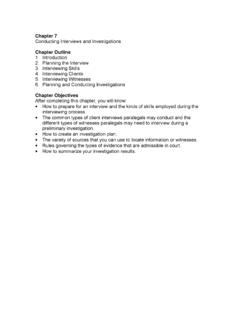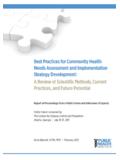Transcription of Service User Involvement, Authority and the ‘Expert-by ...
1 Service user involvement , Authority and the expert -by-Experience'. in Mental Health Tehseen Noorani Authority Research Network Sociology, University of Warwick 50 word biography: Tehseen Noorani is a mental health researcher based in Washington DC. He is interested in community knowledge production and the connections between the personal and the political. He has a PhD in socio-legal studies from the University of Bristol, UK, and has worked in the field of mental health advocacy. 1. Service user involvement , Authority and the expert -by-Experience' in Mental Health This article re-examines the politics of engagement of the UK mental health Service user and survivor movement by focusing upon the mental health expert - by-experience'. Using qualitative data, I illustrate how the Service user and survivor movement is able to draw upon an experiential Authority that is rooted in practices of self-help and peer-support. I do this by bringing an experimentalist reading of self-help and peer-support practices into dialogue with a model of traditional Authority .
2 As such, the personal can be linked up to the political in ways that emphasise the value of self-help and support practices as forms of political participation, while highlighting modes of engagement that are predicated on the capacities, rather than the needs, of the movement. Keywords: Experiential Authority ; positive critique; experts-by-experience;. mental health; self-help; Service user involvement ; survivors. Perhaps we will accord to the so-called schizophrenics who have come back to us, perhaps after years, no less respect than the often no less lost explorers of the Renaissance.. Laing, (1967) p. 107. Introduction This article connects the broadly therapeutic' effects of self-help and support practices with the political capacities of the Service user and survivor movement in mental health. I trace a history of Service user involvement mechanisms in contemporary mental healthcare in the UK, and use interview data to illustrate some of the political responses to these forms of governance.
3 I then draw upon political theory to develop a concept of experiential Authority , in order to better grasp what is distinctive about the idea of expertise-by-experience' in mental health. I argue that we need to appreciate the positivity of the Authority that is being produced in the Service user and survivor movement, by connecting the capacities and techniques developed in the practices of 2. living through distress and working upon experiences of mental distress in self-help and support group settings to the political potential of the emergent actors. I attend to certain capacities and techniques produced within self-help and support group practices for the purposes of intervening in one's own distress, that are then utilised by Service users and survivors when engaging with governmental mechanisms, healthcare professionals and the broader public on questions of what we mean by mental distress and madness', how we should deal with it and how we might challenge stigma in mental health.
4 This article therefore encourages attending to self-help and peer support spaces for working on mental distress as sites for developing new tools of political engagement, rather than accepting the dichotomy that self-help and support practices are proper to questions of health, while advocacy and campaigning are matters for activism. At the same time, it contributes to emerging conceptualisations of experiential Authority (see also Dawney and Millner, both this volume). I draw upon qualitative empirical data from a three-year study of the capacities of the mental health Service user and survivor movement in the UK, conducted between 2008 and 2011, and include interviews with local and national members of two self-help networks Bipolar UK1 and the Hearing Voices Network2 and interviews with one local survivor activist and one local government mental health commissioner. My aim is to use the interviews to illustrate the argument of the article, rather than provide a systematic or comprehensive overview of the key themes found in the interview data.
5 Section I: Service user involvement and Survivor Activism Over the last twenty years, mental healthcare in the UK has proclaimed the need and value of Service user involvement . Its importance is evident in government policy 1. At <last accessed 13th May 2012>. 2. At <last accessed 13th May 2012>. 3. (DoH, 1999, 2000, 2001, 2005, 2009, 2011; Lewis, 2009), emphasising how Service users are experts-by-experience with a privileged understanding of their mental distress, what they need for their recovery, and how current Service provision is, and is not, providing it. Beresford (2002) suggests Service user involvement has emerged out of two different rationales for participation one consumerist, the other democratic. The former claims that greater efficiency, efficacy and effectiveness will result from appropriately-placed Service user feedback mechanisms. The latter, democratic approach, often framed in a rights discourse, views user participation as a form of self- advocacy.
6 Pilgrim (2005) suggests a similar if more politicised distinction, between co- opted' Service users on the one hand and activists or survivor' Service users on the other. The term survivor' refers to those who have survived not only their mental health difficulties, but also experiences of psychiatric services , and/or the accompanying general social exclusion (ibid.: 19). Pilgrim thus describes a tension between user involvement as a management resource and as a manifestation of protest: On the one hand experts by experience' have been a part of a new social movement of disaffected Service users attacking psychiatric theory and practice. On the other hand, the oxymoron of a lay expert ' has found its time and modern health and welfare bureaucracies now emphasise consumerism as a source of quality improvement (ibid.: 17). For the sake of clarity, this article will refer to the Service user and survivor movement as being distinguishable, on historical and teleological grounds, on the one hand by a Service user ' component, and on the other, by a survivor' or activist' component.
7 Service user spaces are used to measure and evaluate Service provision, using feedback to improve future Service delivery. Survivor/activist spaces promote user -led Service development, often reframing the problems faced by mental healthcare governance and the mainstream solutions to these problems. While Service user and survivor/activist 4. spaces overlap enormously in practice, the distinction is helpful in indicating divergences in their respective histories and aims. The Historical Context We can trace a history of Service user involvement in statutory policy and guidance from when the rhetoric of user involvement ' became a central part of NHS policy during the establishment of the Community Health Councils in 1973. This continued through the proliferation of New Public Management principles and the growing importance of measures of satisfaction in the 1980s (Tait and Lester, 2005). The 1990. NHS and Community Care Act established a formal requirement for Service user involvement in Service planning.
8 From 1997, patient and public involvement were a central tenet of New Labour's NHS modernisation agenda (DoH, 1999), and the NHS. Plan (DoH, 2000) was committed to creating a patient-centred NHS with user needs at the centre of Service design and delivery. Section 11 of the Health and Social Care Act (2001) required all NHS organisations to engage users in planning and evaluating services , as well as in decision-making on issues of treatment. The expert Patients Programme (2001) was hailed by England's chief medical officer as ushering in a new era of opportunity for the NHS (Donaldson, 2003, cited in Greenhalgh, 2009: 631). In 2003, the New Labour government appointed a Patient Tsar' to advise on improving Service user experience, and to publish measures to increase patient choice across the NHS (DoH, 2003). At the same time, the Commission for Patient and Public involvement in Health was established in 2003, whose functions were transferred to Local involvement Networks in 2008, which are currently being replaced by local Healthwatch organisations.
9 The guidance on the Care Programme Approach (DoH, 2008) and the New Horizons (2009) strategy under New Labour further supported user involvement . The most recent strategy, written by the Conservative-Liberal Democrat coalition government, No Health Without Mental Health (2011), appears to have relied 5. less on the notion of involvement ', while emphasising choice', together with a focus on active Service user and carer involvement as well as the fruits of market competition. This perhaps indicates the assumption on the centre-right of the party political spectrum that market-driven choice is tantamount to involvement ; how exactly this pans out is yet to be Nevertheless, this brief history illustrates how the discourse, mechanisms and processes of Service user involvement have become increasingly integrated into all levels of decision-making and Service delivery over the last 40 years. Turning to the survivor movement, the term survivor' emerged when a group of individuals in the early 1970s began campaigning and protesting against the treatment of those in the mental healthcare system, while opposing the dominance of medical interpretations of their experiences (Tait and Lester, 2005).
10 As a grass-roots movement, it was accompanied by an intellectual critique against biomedical models of illness and coercive measures of control, in what became known as the anti-psychiatry' movement (for example, Cooper, 1969; Goffman, 1961; Laing, 1960; Szasz, 1974). However, the history of mental health activism can be dated far further back, to 1620, when inmates at the Bedlam asylum petitioned for their rights (Weinstein, 2010). In the contemporary period, from national organisations such as Survivors Speak Out (formed 1986) and the United Kingdom Advocacy Network (formed 1990) to local survivor organisations today, their approach to involvement has been more overtly oppositional toward models of illness and care than the Service user involvement movement, often drawing upon human rights discourses. Rose (2001: 67) claims that the user movement in the UK. 3. There is another important thread to the history of recent government policy, concerning the development of mechanisms for coercing mental health Service users in the name of public risk'.





